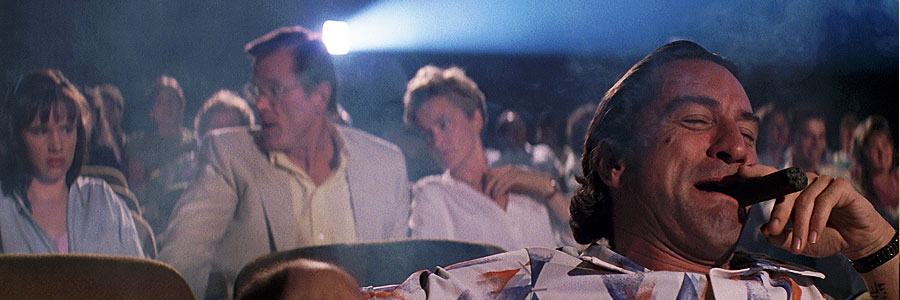
Cape Fear

CAPE FEAR (MOVIE)
Amblin Entertainment
Original release: November 13th, 1991
Running time: 127 minutes
Director: Martin Scorsese
Writer: Wesley Strick
Cast: Robert De Niro, Nick Nolte, Jessica Lange, Juliette Lewis, Robert, Robert Mitchum, Gregory Peck

Generally, I respect the law and think it’s a system that’s largely fair and reasonable in affecting our daily lives. Yet, it is not at all inconceivable that breaking the law can be the morally right thing to do. It’s only a shame we can’t hold our heads up when doing so; we have no choice but to hide – and whoever is on the other side has the upper hand. The reason I like Martin Scorsese’s Cape Fear so much as a remake of the 1962 original, is because of its advanced, morally complex plot that’s in sync with a modern audience that needs more than a traditional ‘good vs. evil’ film.
Sam Bowden (Nick Nolte) is a well-to-do lawyer defending Max Cady (Robert De Niro) who’s being tried for the rape and battery of a young woman. Being illiterate, Cady depends completely on Bowden’s commitment to the law. When Sam sees the photos of the woman and the level of violence Cady inflicted on her, his morals come into conflict with his profession and he decides to hide evidence of the victim’s promiscuity in order to make sure Cady’s sentence isn’t reduced.
The young woman being promiscuous has no real connection to the crime itself – and connecting the two strongly suggests sexism against women in the criminal justice system. Bowden abandons his professional commitment to defend his client to the best of his abilities and Cady is essentially sent to prison by his own defence lawyer.
Fourteen years later Cady is released from prison. While locked up, he learned to read and write, studied law, and when he pays a quick visit to Bowden, he indicates he’s learned about him burying the evidence. Thus begins the Bowden’s family nightmare with Cady subjecting them to persistent harassment that gets progressively worse and violent. Bowden has to fear not only for his own safety, but his unhappy wife Leigh (Jessica Lange) and his rebellious teenage daughter Danielle (Juliette Lewis).

Scorsese puts a strong emphasis on Cady becoming a born-again Christian in prison. He’s exacting religious justice on the Bowden family, frequently quoting from the Bible and claiming he doesn’t actually hate Sam Bowden – he prays for him. Only Martin Scorsese could confirm what he wanted to say with these character opposites; but morality from Christian texts is placed against an innate sense of justice in Cape Fear. Cady is portrayed as a solid character of absolute certainty while Sam Bowden is undoubtedly flawed and yet guided by his own personal instincts of right and wrong.
As a suspense-thriller, Cape Fear is a prime example in Scorsese’s work that he can trespass on Brian De Palma territory and deliver the goods. The camera movement conveys tension constantly by almost nervously moving from face to hand, from hand to door handle – and who knows what’s behind the door?
The cinematography is stylish and vivid throughout; De Niro sitting on the garden wall of the Bowden family with the intense 4th of July fireworks in the background is just one of the memorable over-the-top scenes in the film. The characters are gritty  and realistic, as opposed to the perfect image of the nuclear family in the original; Juliette Lewis is especially superb as Danielle, whose difficult relationship with her father makes her dangerously receptive to Cady’s grooming.
and realistic, as opposed to the perfect image of the nuclear family in the original; Juliette Lewis is especially superb as Danielle, whose difficult relationship with her father makes her dangerously receptive to Cady’s grooming.
There’s plenty of subtext to unpack in Cape Fear. The subject of religion plays a role throughout; Max Cady appears to possess super-human abilities at times, and prior to the last confrontation, Bowden talks about the “force majeure” defence, which in law is defined as an unforeseeable act of God.
Bowden and his troubled family are portrayed as imperfect but nevertheless very much human and up against something inherently rigid that’s technically right but morally wrong. Robert De Niro is as menacing as he’s ever been playing the legendary villain. His first encounter with Bowden and his family in the cinema says it all – Cady wants trouble and he’s going to enjoy every second. The terror that’s gradually inflicted on every aspect of their lives culminates in a terrifying showdown making Cape Fear an unmissable Scorsese thriller.

Arpad Lukacs
Arpad is a Film Studies graduate and passionate photographer (he picked up the camera and started taking stills just as he began his studies of moving pictures). He admires directors that can tell a story first of all in images. More or less inevitably, Brian De Palma has become Aprad’s favourite filmmaker.
Then there’s Arpad’s interest in anime. He was just a boy when he saw Nausicaä of the Valley of the Wind on an old VHS and was hypnotised by the story of friendship, devotion and sacrifice. He still marvels at the uncompromising and courageous storytelling in Japanese anime, and wonders about the western audience with its ever growing appetite for “Japanemation”.
Have a look at Arpad's photography site, and you can follow him on Twitter @arpadlukacs.
© 2022 STATIC MASS EMPORIUM . All Rights Reserved. Powered by METATEMPUS | creative.timeless.personal. | DISCLAIMER, TERMS & CONDITIONS
HOME | ABOUT | CONTACT | TWITTER | GOOGLE+ | FACEBOOK | TUMBLR | YOUTUBE | RSS FEED
CINEMA REVIEWS | BLU-RAY & DVD | THE EMPORIUM | DOCUMENTARIES | WORLD CINEMA | CULT MOVIES | INDIAN CINEMA | EARLY CINEMA
MOVIE CLASSICS | DECONSTRUCTING CINEMA | SOUNDTRACKS | INTERVIEWS | THE DIRECTOR’S CHAIR | JAPANESE CINEMA





